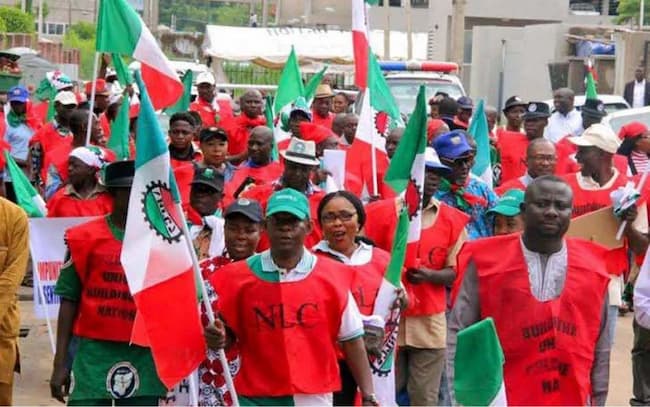The organised Labour may soon call off its strike over the new minimum wage following an agreement with the Federal Government reached on Monday.
In a six-hour meeting in Abuja, the Federal Government reaffirmed President Bola Tinubu’s commitment to raising the minimum wage above the N60,000 initially offered. The discussions, held at the office of the Secretary to the Government of the Federation, aimed to resolve the deadlock that had halted operations across various sectors nationwide.
Key resolutions from the meeting included a commitment to establishing a national minimum wage higher than N60,000. The Tripartite Committee will meet daily over the next week to finalize this figure. Organised Labour agreed to convene meetings to discuss the new offer, assuring that no worker would face repercussions for participating in the strike.
The Federal Government was represented by Minister of Information and National Orientation Mohammed Idris and Minister of State for Labour and Employment Nkeiruka Onyejeocha. Labour representatives included Nigeria Labour Congress President Joe Ajaero and Trade Union Congress President Festus Osifo.
Further negotiations between the Federal Government and organised Labour are scheduled for today (Tuesday). This comes amidst a nationwide strike that disrupted activities in states and the Federal Capital Territory, Abuja, on Monday. The meeting, detailed in an invitation signed by Tripartite Committee Secretary Ekpo Nta, is set for 10 AM at Nicon Luxury Hotel, Abuja.
Minister of Information and National Orientation Mohammed Idris expressed concern over the strike’s impact, calling for continued negotiations. He highlighted the financial implications of Labour’s proposal for a N494,000 minimum wage, which would result in an annual wage bill of N9.5 trillion for the Federal Government.
Idris urged Labour to return to the negotiation table, emphasizing the government’s openness to dialogue. He noted that the National Assembly had engaged with union leaders and reiterated the government’s willingness to continue discussions.
The Labour Party also called for re-negotiation, deeming the N494,000 demand unrealistic. National Publicity Secretary Obiora Ifoh stressed that the strike exacerbates existing hardships and that the proposed wage is unsustainable.
Meanwhile, the strike saw widespread compliance across the country. In states such as Osun, Ogun, Lagos, Niger, Sokoto, and Kano, public institutions, banks, and utilities were shut down. In Osogbo, Osun State, government offices and power stations were closed, with security personnel deployed to enforce the shutdown. Public schools and hospitals also ceased operations.
Labour leaders emphasized the need for the Federal Government to address workers’ welfare and reverse recent electricity tariff hikes. In Ondo State, there was complete compliance with the strike, with public offices and schools remaining closed. Similar situations were reported in Sokoto and Niger States, where labour leaders ensured adherence to the strike.
The Nigeria Labour Congress and Trade Union Congress declared the indefinite strike on Friday after failed negotiations with the Federal Government over the minimum wage and other issues, including the withdrawal of power sector subsidies and increased electricity tariffs.
With negotiations set to resume, there is hope for a resolution that addresses the concerns of both the government and Labour, potentially ending the strike that has significantly impacted the nation.













